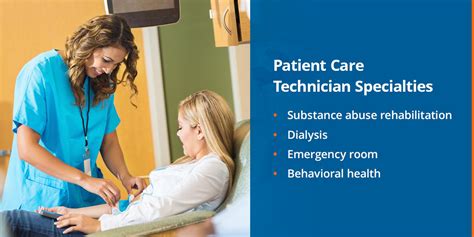Intro
Discover the essential role of a Patient Care Technician in healthcare. Learn about the job description, responsibilities, and skills required to excel in this position. Explore the daily tasks, patient interaction, and medical procedures involved in this rewarding career, and find out how to become a vital part of a healthcare team.
As the healthcare industry continues to grow and evolve, the demand for skilled and compassionate professionals is on the rise. One crucial role that plays a vital part in ensuring the delivery of high-quality patient care is the Patient Care Technician (PCT). In this article, we will delve into the Patient Care Technician job description and responsibilities, exploring the skills, qualifications, and duties required to excel in this rewarding career.

What is a Patient Care Technician?
A Patient Care Technician, also known as a Nursing Assistant or Certified Nursing Assistant (CNA), is a healthcare professional responsible for providing basic care and support to patients under the supervision of licensed nurses and other medical professionals. PCTs work in various healthcare settings, including hospitals, clinics, nursing homes, and assisted living facilities, to ensure the physical, emotional, and social needs of patients are met.
Patient Care Technician Job Description
The primary responsibility of a Patient Care Technician is to provide direct patient care, assisting with daily living activities, vital sign measurements, and other essential tasks. PCTs work collaboratively with the healthcare team to promote patient comfort, safety, and well-being. Some of the key duties and responsibilities of a Patient Care Technician include:
- Assisting with Daily Living Activities: Helping patients with bathing, dressing, grooming, and toileting, as well as providing support with mobility and transfers.
- Vital Sign Measurements: Taking and recording patients' vital signs, such as temperature, blood pressure, pulse, and oxygen saturation.
- Providing Basic Care: Assisting with feeding, hydration, and elimination needs, as well as providing emotional support and comfort to patients.
- Monitoring Patient Conditions: Observing patients' physical and emotional conditions, reporting any changes or concerns to the healthcare team.
- Maintaining a Safe Environment: Ensuring the patient's room and surrounding areas are clean, tidy, and free from hazards.
Key Skills and Qualifications
To succeed as a Patient Care Technician, individuals should possess a combination of skills, knowledge, and personal qualities. Some of the key requirements include:
- Compassion and Empathy: Providing emotional support and comfort to patients and their families.
- Communication Skills: Effective communication with patients, families, and healthcare team members.
- Physical Stamina: Ability to lift, transfer, and move patients safely.
- Attention to Detail: Accurate recording of vital signs and patient information.
- Teamwork and Collaboration: Working collaboratively with the healthcare team to promote patient care.

Education and Training
To become a Patient Care Technician, individuals typically require a high school diploma or equivalent, as well as completion of a state-approved training program. Many community colleges, vocational schools, and online institutions offer PCT training programs, which may include:
- Certified Nursing Assistant (CNA) Training: A state-approved training program that prepares individuals for the CNA certification exam.
- Patient Care Technician Training: A program that teaches the skills and knowledge required to work as a PCT.
Work Environment and Schedules
Patient Care Technicians work in various healthcare settings, including:
- Hospitals: Acute care hospitals, rehabilitation hospitals, and specialty hospitals.
- Clinics: Outpatient clinics, physician offices, and urgent care centers.
- Nursing Homes: Long-term care facilities, assisted living facilities, and skilled nursing facilities.
PCTs typically work varied shifts, including days, evenings, nights, and weekends. Some may work part-time or full-time schedules, depending on the employer's needs.

Salary and Benefits
The salary and benefits for Patient Care Technicians vary depending on the employer, location, and level of experience. On average, PCTs can expect to earn:
- Hourly Wage: $12-$18 per hour.
- Annual Salary: $25,000-$35,000 per year.
- Benefits: Health insurance, paid time off, and retirement plans may be offered by employers.
Conclusion and Career Outlook
The Patient Care Technician role is a vital part of the healthcare team, providing essential care and support to patients. With the growing demand for healthcare services, the job outlook for PCTs is promising. If you are compassionate, dedicated, and enjoy working with people, a career as a Patient Care Technician may be the perfect fit for you.
Frequently Asked Questions
What is the difference between a Patient Care Technician and a Certified Nursing Assistant?
+A Patient Care Technician and a Certified Nursing Assistant (CNA) are similar roles, but a CNA has completed a state-approved training program and has passed the certification exam. A PCT may or may not be certified.
What are the typical work hours for a Patient Care Technician?
+PCTs typically work varied shifts, including days, evenings, nights, and weekends. Some may work part-time or full-time schedules, depending on the employer's needs.
How long does it take to become a Patient Care Technician?
+The training program for a PCT typically takes several weeks to several months to complete, depending on the institution and the individual's prior experience.
We hope this article has provided you with a comprehensive understanding of the Patient Care Technician job description and responsibilities. If you have any further questions or would like to share your experiences as a PCT, please leave a comment below.
